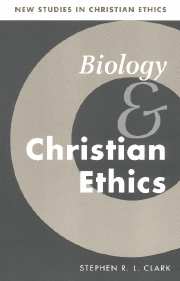Book contents
- Frontmatter
- Contents
- General editor's preface
- Preface
- Introduction
- 1 The development of Darwinian theory
- 2 Moral and metaphysical assumptions
- 3 Trying to live in nature
- 4 The biology of sin
- 5 Human identities
- 6 The goals of goodness
- 7 The end of humanity
- 8 The covenant with all living creatures
- 9 Conclusion: cosmos and beyond
- Index
9 - Conclusion: cosmos and beyond
Published online by Cambridge University Press: 02 December 2009
- Frontmatter
- Contents
- General editor's preface
- Preface
- Introduction
- 1 The development of Darwinian theory
- 2 Moral and metaphysical assumptions
- 3 Trying to live in nature
- 4 The biology of sin
- 5 Human identities
- 6 The goals of goodness
- 7 The end of humanity
- 8 The covenant with all living creatures
- 9 Conclusion: cosmos and beyond
- Index
Summary
THE OPEN AND CLOSED COSMOS
One of the many oddities of late twentieth-century environmentalist rhetoric has been the insistence that we need to abandon the old, monotheistic metaphysics in favour of a more pantheistic sensibility. Monotheists, it is supposed, believe that the wholly admirable, the Divine, is Somewhere Else than here, and that we human beings need not consider anything this-worldly worth respect. Pantheists, on the other hand, suppose that God, the wholly admirable, is Here, and that we cannot detach our human kind from earth. The charge against monotheists is at least unproved. Pagan and Abrahamic monotheists have repeatedly affirmed the value, to God and to His saints, of this world here. Nor is there any good reason to believe that other peoples, far away or long ago, have ever behaved much better. But what is really odd about the rhetoric is that, through all the centuries of Western domination which environmentalists most often blame for our present crisis, it has been a pantheistic metaphysics that has had most influence.
Benedict Spinoza, it can plausibly be argued, was the first modern philosopher. He was traditional in seeking scriptural excuses for his claims, and finding ways of making a traditional (largely Stoic) philosophy plausible. He was modern in insisting that there was no distinction between God and Nature, no wider field of explanation than the cosmos itself, nor any higher value than could be found therein.
- Type
- Chapter
- Information
- Biology and Christian Ethics , pp. 301 - 319Publisher: Cambridge University PressPrint publication year: 2000



